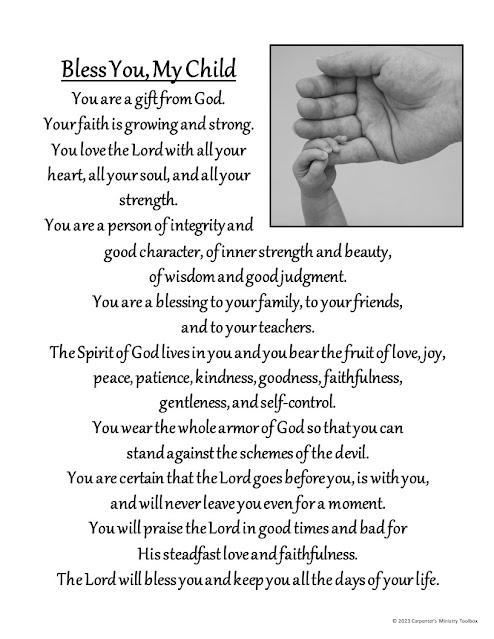Wednesday, April 24, 2024
LEADERSHIP: TeleCare -- Care for the Elderly Living Alone
Thursday, February 1, 2024
CONFIRMATION: The Memory Work Conundrum
I often hear pastors or other confirmation educators complain about students and memory work. The common complaints are:
- Kids aren't doing it.
- Parents aren't making kids do it.
- I (the teacher) am the only one who cares.
- I don't have any leverage, so why expect it?
- Expectations
- Accountability
EXPECTATIONS
- Kick-off Meetings - At the beginning of every year, I have a kick-off meeting to make sure everyone is on the same page with what's required. Never assume they know what you expect. Not only do I provide a calendar or a simple syllabus, but I talk about behavior and academic expectations.
First, I ask parents to think about why they want their kids to be confirmed. They should know the reason and it helps the teacher know where they're coming from. Then, I hand out FAQs (Frequently Asked Questions) and we talk about them. They include some history and tradition of confirmation, its purpose, how parents can support their kids through confirmation, how parents can also support the pastor, what is taught, why memorization and sermon notes (connections) are important, and why confirmation has a place in our culture today.
Then, I talk about expectations. I go over what I expect of their behavior and let them know that I will contact them if their child behaves in a way that consistently disrupts class. Next, I share the requirements for participating in the privilege of confirming their faith. Finally, I ask a very important question: "Why do they think I am here?" This one is unexpected. I explain that I'm not here because it's my job. I think confirmation is important to their kid's faith and why it's important to start talking about it at this age. "If you're not going to expect your child to do the work or don't think the work is important, what do you want them to get out of it? If they haven't learned anything, what is it that they are confirming that they believe and why do they believe it? What is the benefit for them and what does it teach them about their faith or the church? Confirmation is not a requirement for salvation, but teaching about God and His plan for their salvation is. The FAQs are also discussed in The Art of Teaching Confirmation Resources, and there's a post about them on this website here.
ACCOUNTABILITY
- Checklists - I know people don't think they should officially keep track of grades for confirmation, but we don't keep track to grade the kids. We keep track of their progress for informational purposes. I use a simple minus, check mark, and plus. (Minus: not much effort, Check mark: acceptable effort, Plus: good or great effort)
I promise it will help you if parents know you're keeping track of attendance and work. If you don't keep track, when you say a student isn't doing their work, you have no data to fall back on. Also, all it takes is a check mark every week and you have everything you need to let students and parents know that you care about them learning, enough to pay attention to how many classes they've missed and what work they need to make up. On the confirmation page of this website there are checklists. Use one or create your own. Resources for this are also in my book, The Art of Teaching Confirmation Resources.
- Progress Reports - A progress report is never a bad idea. It periodically lets parents know how things are going. Since class usually only meets weekly, I only give one once a year, unless it's obvious that students aren't doing their work. They can either be printed or via a phone call. If a student is missing work two weeks in a row, a parent should be notified. It's always better to take care of these things right away. It doesn't help to wait until they're months behind to speak up about it.
Why don't kids see the value in it? Because they're 13-14 years old. No matter how many cheers or pep talks they hear, they're not going to care. They're kids. They need some real consequences for not doing the work. That's why we need the parents to understand why it's important.
LEVERAGE
Without grades, there are very few options for leverage. It's a volunteer class and we worry that if we push, parents will take their kids out. Nobody wants that. What are the options? Confirm kids who have done nothing all year and know nothing about their faith? What is the point in that?- Have a chat with the student and ask them why they seem to not be interested in doing the work or knowing this information. Why not?
- Have a chat with the parents and let them know of the problem. They may share with you some challenges their child has with the work. Adjust it.
- Let them know that confirmation can be done later, if the student is not ready.
- Remind them that confirmation is not required for salvation.
OPTIONS
- Give them a list of what they need to memorize throughout the year and let them do it at their own pace. You still need to keep track of what they have known and it's good to have random memory checks in class. Let them say anything they know, but they can't say the same one every time.
- Put the memory work on the pre-service worship slides every week and right before the service starts, have everyone say it together.
- This one is my personal opinion, however, I prefer to have students memorize God's word over the What does this mean? information in the catechism. Once they say that in class, nobody every repeats it. When you're 14, it's not long before those synapses are overwritten.
- Put time aside for a quick memory review each week where you ask a question and they need to answer it with one of the memory verses. For example, ask a question about baptism and they can respond with Acts 2:38, Mark 16:16, Romans 6:3-4, etc. That also helps them apply it.
Friday, September 29, 2023
WOMEN: Prayer Shower
Some congregations give baby showers to their new mothers, but that tradition can be a challenge to keep up. If the congregation goes through a season of many new babies, having all those showers can be a lot to expect of the members, and it's usually the women who attend them. It can also be a financial burden if people are expected to buy gifts, often for people they do not know.
What we can do as a church is have a PRAYER SHOWER. What's a Prayer Shower? It's an opportunity to give a new mom prayerful encouragement that will last much longer than an evening and bless a child through the mother.
We want to shower New Mom with prayers and faithful encouragement that lasts longer than a day or an event. What does this look like? All of the gifts are sealed envelopes that have on the front something like,(Below are just examples - feel free to come up with your own.) Read this when…
- You need a break.
- The baby won't stop crying.
- You feel helpless.
- You don’t know what to pray.
- You haven't eaten (or showered).
- You're trying something new (taking the baby on errands or going to church).
- You're amazed at the gifts of God.
- You're worried about what people will think or say.
- The baby is teething.
- You’re feeling truly thankful for how God is taking care of you and your baby.
- You would give anything for a hot meal.
- Work demands more than you've got.
- You feel all alone.
- You really don’t want to get up.
- You're somebody says something mean about your parenting skills.
- You think you can’t do it.
- You feel isolated and lonely.
- Parenthood is harder than you thought it would be.
- You’re sick, but the baby is not.
- The baby is sick.
- You have to go back to work.
- You are lonely.
- You look at your sleeping gift from God and your heart is full.
THERE ARE A MILLION OPTIONS!
In your card you can include Bible verses, prayers, an encouraging poem, a personal note, or a story to help Mom get through the moment or the day. Never discount your own experience as not being encouraging. Sometimes all we need is to know that what we're going through is common! We are not alone.
THIS IS NOT A REGULAR BABY SHOWER WHERE EVERYONE IS
EXPECTED TO BRING MATERIAL SHOWER GIFTS. If you want to give a material gift,
please do that at another time. This event is a PRAYER
SHOWER.
Example:
A Prayer Shower can be done as a gathering, with yummy treats, or without. I never say no to yummy treats, but since the goal is focused on giving the mom-to-be spiritual encouragement and support, a prayer shower can be done by having people send their support cards or letters directly to the new mom, or they can be put in her church mailbox.
My gift to new moms at our church is the following blessing, framed to hang on a wall near the baby's bed, and intended to be said to that child every morning and/or every night.
Tuesday, June 20, 2023
YOUTH: High School Faith Builder Program
The High School Faith Builder Program
The Faith Builder Program is, in many ways, an extension of confirmation. It continues through high school and hopefully instills in youth a desire to always keep learning and seeking God's truth in the Word. It needs to be planned ahead so everyone knows what they're going to do as a group.Below is a chart of a program I would create that includes the 7th and 8th grade confirmation years. This can be done on Wednesdays or during Sunday School hour. It's very interactive and may not take the whole year, which means you can still have time to study other topics. Students should be able to work together and choose project themes. Timelines, and work groups should be discussed, but approved by the leader. These classes are intended to be fun, engaging, and educational.
Year/ Grade | Study | Service/Leadership | Project |
7th | Catechism MS Bible Reading Plan Year 1 (Old Testament) | In-church Service Out-of-Church Service | Faith Journey Poster (Talk to family members about faith.) |
8th | Catechism MS Bible Reading Plan Year 2 (New Testament) | In-church Service Out-of-Church Service | Reflection Paper |
9th | Worship Education Worship Music Study - Hymn Studies - Contemporary Music Studies - Camp Music LCMS & Social Issues: Where do we stand? | In-Church Service Out-of-Church Service Work with junior students to develop a worship service. | Worship Music Project (Music reflecting beliefs) Evaluate Adult Bible Studies (using an evaluation tool) |
10th | HS Bible Reading Plan Year 1 (Old Testament) Discipleship 101 | Sit in on various boards or committees. See what interests them. | Work with Sunday School children on an Old Testament Story presentation. |
11th | HS Bible Reading Plan Year 2 (New Testament) Discipleship 201 | Leadership – participate on a board or committee | Plan & Organize a Worship Service (work with peers). |
12th | Surprised by Joy by C.S. Lewis Mere Christianity by C.S. Lewis The Screwtape Letters by C.S. Lewis | Leadership – Plan and organize an event at church. | Use a creative way to share their beliefs: create a video, write a book, use creative drama, write a song, etc. These should be shared with the congregation on or around graduate recognition Sunday. (Previous post) |
- Service within the congregation - Students need to transition into adult roles by starting to take an active part in the congregation though ushering, reading Scripture, being Sunday School teacher aids, doing yard work or working on the facility, working or participating on a board and/or being a part of a "ladies" group or larger church ministry of some kind. This should include multi-generational activities. If they have an idea of their own about how they can serve, perhaps starting a homework club, have them propose it at a board meeting.
- Service outside of the congregation - This could begin at any time and should not be something they do with a large youth group but could be done with one or two friends. We want them to live lives of service and understand that it doesn't have to happen within and "event" or "mission trip." They can volunteer to visit nursing homes, clean their grandma's home or garage, help an older person in their neighborhood, volunteer to take care of a younger person for somebody, stay after school to help a teacher, read to younger kids, etc.
- Organize an event. Students should organize (with a few friends) a church event. The older kids should take the key leadership roles while the younger kids learn from them. The key to this working is not to let adults take over and do it for them.
- Visit adult Bible studies. Students can do an evaluation of some kind that includes questions about the content and asks their opinion of what was discussed. They need to feel absolutely welcome and encouraged to attend and ask any questions they might have. Some older adults may have difficulty with this, but it's an important step in the transition into adult participation in the congregation.
- I believe... - Students can work together to create a document of their beliefs. It can be a video, book, creative drama, song, etc., but should be in their own words. (This document may help.) The goal of every Christian is not just to be concerned about their own relationship with God, but to be able to share the gospel with others.
- Develop Worship Service - After learning about worship, students organize and lead a worship service. It should contain all appropriate elements, a theme, appropriate music, a message about what they believe with specific teachable moments for the congregation, etc. They'll need guidance from the pastor and be given structure. These documents might help: worship table of parts, blank worship table of parts, biblical history of worship, and worship service planning outline.
The Send Off
Send-Off Sunday is also graduate recognition Sunday. Imagine what they will have learned and how much fun they will have being creative while developing their belief system. Imagine how much they will feel a part of the congregation after serving in the congregation, participating on boards, and being welcome in adult Bible study. On this day, the seniors will share their projects (video, book, skit, song, etc.) with the congregation. Depending on the size of the group it can be done during worship or afterward with a potluck. Please be sure to have families come up and put their hands on their kids as you pray for them. Have the other students in the group write and say the prayer.
Saturday, May 13, 2023
EDUCATION: Bible News Information Sheets
Monday, April 24, 2023
YOUTH: The Truth About STDs
Looking for a more practical reason to give your youth? Here's a good one.
According to the World Health Organization (2022) there are more than 30 different bacteria, viruses, and parasites that can be transmitted through sexual contact. Think you can just go to the doctor on campus and get a pill? Well, friends, think again. All are treatable, but only four are currently curable. FOUR!
Women can take the pill to try and prevent pregnancy, but it doesn’t protect them from many sexually transmitted diseases (STD) or infections (STI), though it may help for a few of them. Do you want to take that risk?
For the record, sexual contact means any time skin touches skin, whether it’s a hand, a mouth, or any other part of the body. People were told to wash their hands and be careful what they touch to prevent the spread of Covid-19, a coronavirus. Touching someone’s infected genitals or genital area transmits a virus too. Not only that, but many of them can be transmitted from mother-to-child during pregnancy, childbirth, and breastfeeding, and worse, some of them can cause cancer and infertility, and even worse, you may not know you have one or are passing it around. The next time you think God’s rule about not having casual sex or sex outside of marriage is ridiculous, think about that.
There are millions of new infections every year and again, you don’t always know you have one. The ONLY way to know for sure that you’re not getting a sexually transmitted disease is to not have casual sex before marriage, and that means vaginal penetration, oral sex (putting mouth, tongue, or lips on another person's genitals -- front or back). Syphilis, HPV, and herpes are known to cause symptoms in the mouth and throat. Others that can be spread orally include gonorrhea, chlamydia, trichomoniasis, hepatitis A, hepatitis B, and HIV. Please remind youth that many of these have NO SYMPTOMS. If you are treating sex like a recreational activity, you will not know you have one of these unless you are tested, and tested often.
Friday, April 21, 2023
CONFIRMATION: What's a good confirmation teacher?
What's a good teacher?
Can kids recognize a good teacher? What is their criteria? Most kids, especially teens, consider a teacher good if:
- They're getting a good grade. What if everyone in that class is getting a good grade? Is getting a good grade more or less important than earning that grade and learning?
- The teacher is fun or funny or cool. What if the most popular teacher is also the one who has the lowest academic and behavioral standards? Is caring about what a student learns more or less important than being cool?
- The teacher is too lenient and students can easily change his/her mind or get away with things they shouldn't. Is holding a student accountable for their choices more or less important than them getting their way?
- The teacher has low academic expectations or homework as long as they get a good evaluation.
If a student's only criteria for good or bad teaching is how they feel, can they truly know the difference between a good or bad teacher? Kids are kids. That's why they need parents and teachers who care enough to do what's best for them even when they don't like it. It is common for a child to tell their parents that a teacher is bad if:
- They don't like the class and don't want to be there.
- They are getting a bad grade.
- The teacher consistently expects them to do their best.
- The teacher isn't fun because his/her first priority is that they learn.
- They hear their parents speaking badly about the teacher at home.
- They think their parent will automatically agree with them.
It's important that teachers be approachable and friendly, but they are often portrayed by students as bad teachers because they know they are about to get in trouble for something they know they should have done, or shouldn't have done. It's the same with parents of teens. You're the greatest parent in the world when you let your child do what s/he wants, but the minute you say no, you're the worst. Sometimes a child's favorite teacher is a favorite because of their personality and not their teaching expertise. Let's not discount some important things about that though. Good teachers:
- Care about their students as people and show that in how they interact with them. They're friendly even though they have standards.
- Care about whether or not their students are learning what they're being taught. They're approachable and ready to help.
- Teach students more than their subject, but also about life, accountability, the value of hard work, and the benefit of good habits and character.
- Want to partner with parents so they communicate with them when their children are not doing the work they should be doing.
- Have requirements that benefit their students even if they don't see that benefit yet.
- See the bigger picture of their student's life and try to prepare them for challenges and what comes next.
What's a good confirmation teacher?
If you're a parent or a student, before you complain about a pastor or other teacher of confirmation, check this list. Does your pastor/confirmation educator:
- Care about getting to know your child?
- Care about whether or not your child participates in class learning activities?
- Care about whether or not your child is doing their memory work?
- Attempt to give your child the information necessary in a way they can understand it?
- Attempt to help your child understand difficult doctrinal concepts through stories and examples?
- Attempt to get your child (and their parents) to read the Bible?
- Make himself available to have difficult conversations about the Bible and life?
- Let students and parents ask questions about anything they may be struggling with?
- Talk to parents about the importance of putting their child's faith above sports? School sports usually last until kids graduate from high school, and sometimes college. Faith is both lifelong and eternal.
- Expect your child to do the work necessary to increase their faith? Or has it been watered down to the point where it's fun, but they aren't really learning much?
- Care about whether or not your child will meet you in heaven one day?
These are the qualities of a good confirmation teacher. If your pastor does these things, you should not be complaining, but appreciating and thanking.










